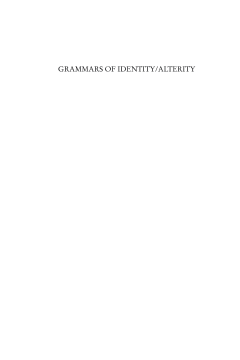
Additional Information
Book Details
Abstract
Issues of the construction of Self and Other, normally in the context of social exclusion of those perceived as different, have assumed a new urgency. This collection offers a fresh perspective on the ongoing debates on these questions in the social sciences and the humanities by focusing specifically on one theoretical proposition, namely, that the seemingly universal processes of identity formation and exclusion of the 'other' can be differentiated according to three modalities. All contributors directly engage with rigorous empirical testing and theoretical cross-examination of this proposition. Their results have direct implications not only for a more differentiated understanding of collective identities, but also for a better understanding of extreme collective violence and genocide.
Andre Gingrich is Professor for Social Anthropology at Vienna University and Member of the Austrian Academy of Sciences. His ethnographic field interests include the Muslim Middle East, but also Tibet and Austria. Having lectured and taught at SAR (Santa Fé), the University of Chicago, and other institutions in the US and Europe, his books include Anthropology by Comparison (2002, co-edited with R.G.Fox).
Gerd Baumann† was Reader in Social Anthropology at the Research Centre Religion & Society of the University of Amsterdam. His other titles included National Integration and Local Integrity: The Miri of the Nuba Mountains in the Sudan (1986), Contesting Culture: Discourses of Identity in Multiethnic London (1996) and The Multicultural Riddle: Rethinking National, Ethnic and Religious Identities (1999).
“A short review cannot do justice to the richness of this, or to the problems posed by its analytical framework…This is a thought-provoking, problematic even troubling volume with many excellent chapters.” · The Journal of the Royal Anthropological Institute
"This book's strength is two-fold. First, as an edited volume it was delightfully cohesive, with each author considering the same set of basic questions, and utilizing the three grammars as a frame for examining identity in their various contexts...The second core strength for me is the fluid treatment of both structural and agentic aspects of identity...I found this a stimulating volume and think it has much to offer for readers interested in better understanding identity processes." · Anthropology and Education Quarterly
Table of Contents
| Section Title | Page | Action | Price |
|---|---|---|---|
| Grammars of Identity/Alterity | iii | ||
| Copyright Page | iv | ||
| Contents | v | ||
| List of Figures | vii | ||
| Foreword | ix | ||
| Acknowledgments | xv | ||
| Step I. From an Essentialised Use of‘Othering’ to a Differentiation of Grammars | 1 | ||
| Chapter 1. Conceptualising Identities | 3 | ||
| Chapter 2. Grammars of Identity/Alterity | 18 | ||
| Step II. From a Repertoire of Grammars to Hierarchies and Power | 51 | ||
| Chapter 3. Othering the Scapegoat in Nepal | 53 | ||
| Chapter 4. German Grammars of Identity/Alterity | 63 | ||
| Chapter 5. Alterity as Celebration, Alterity as Threat | 79 | ||
| Step III. From Power to Violence – when Grammars Implode | 99 | ||
| Chapter 6. Completing or Competing? | 101 | ||
| Chapter 7. ‘Out of the Race’ | 112 | ||
| Chapter 8. Dehumanization as a Double-Edged Sword | 142 | ||
| Step IV. From Testing Grammars to Widening the Debate | 155 | ||
| Chapter 9. Between Structure and Agency | 157 | ||
| Chapter 10. Encompassment and its Discontents | 173 | ||
| Chapter 11. Debating Grammars | 192 | ||
| Notes on Contributors | 205 | ||
| Subject Index | 209 | ||
| Name Index | 215 |
